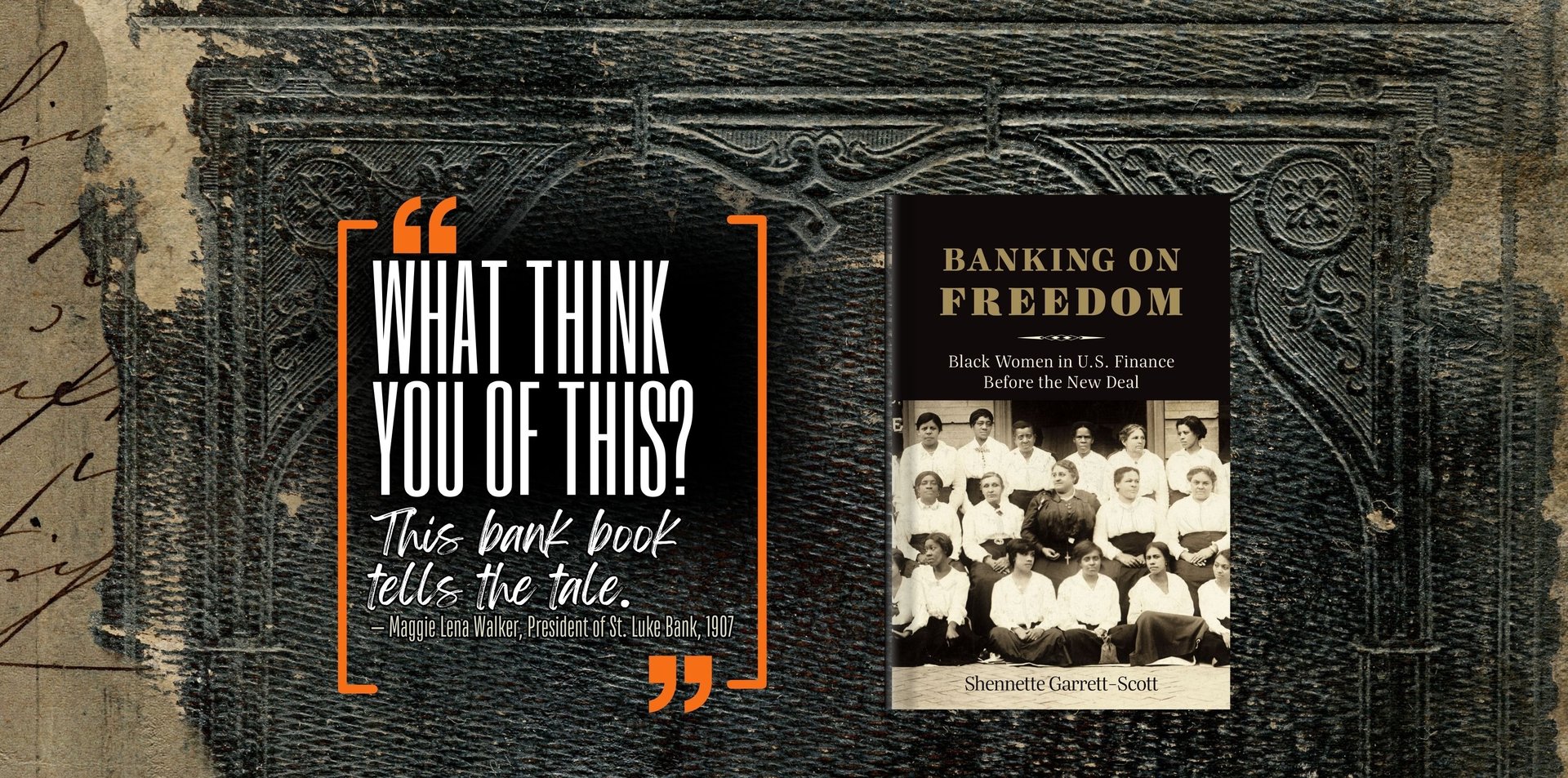
BANKING ON FREEDOM
WINNER OF THREE BEST BOOK AWARDS
Organization of American Historians
2020 HINE AWARD
for Best Book in Black Women's
and Gender History








Association of Black Women Historians
2019 BROWN AWARD
for Best Book in
Black Women's History
Southern Historical Association
2020 WALL AWARD
for Best Book in Southern Business
and Economic History
Hagley Library + Business History Conference
Shortlisted for
2020 HAGLEY PRIZE
for Best Book in Business History

Moving fluidly from the change purse to the bank vault, Banking on Freedom offers the first full accounting of the financial sector, womanhood, and Afro-America simultaneously transformed. Rich and brilliant.
N. D. B. Connolly, author of A World More Concrete: Real Estate and the Remaking of Jim Crow South Florida
Garrett-Scott’s extensively researched and documented study is the first history of U.S. finance that puts African American women at the center. Banking on Freedom makes a tremendously monumental contribution to African American banking history, and it substantially enriches our understanding of U.S. finance and capitalism.
Juliet E. K. Walker, author of The History of Black Business in America: Capitalism, Race, Entrepreneurship
Shennette Garrett-Scott’s compelling and highly original account demonstrates that, for Black people, banks were more than financial institutions. In the hands of Black women, capital accumulation, credit, and insurance became community building practices, mutual aid, strategies for collective survival, and sources of contestation. Banking on Freedom offers a new perspective on the entire community and the nation.
Robin D. G. Kelley, author of Freedom Dreams: The Black Radical Imagination
Recovering the important and active role lack women have played in the development of modern American capitalism, Shennette Garrett-Scott’s Banking on Freedom is a paradigm-shifting work that stands to make a monumental contribution to the field and is certain to inspire future generations of scholars.
Tiffany M. Gill, author of Beauty Shop Politics: African American Women’s Activism in the Beauty Industry
Garrett-Scott reclaims the stories of Black women who—as bank founders and clerks, investors, aspiring home owners, loan seekers, and, yes, as those denied loans—asserted their own economic ethos. A compelling account of Black women’s ideas about money, savings, lending, obligation, and economic well-being.
Elsa Barkley Brown, associate editor of Black Women in America: An Historical Encyclopedia
A beautifully written, comprehensive, and highly original study of Black women’s savvy business acumen in the aftermath of slavery through the early twentieth century. Garrett-Scott should be commended for boldly modeling just how gender and race shape capitalism and finance in ways few scholars have addressed.
Daina Ramey Berry, author of The Price for Their Pound of Flesh: The Value of the Enslaved, from Womb to the Grave, in the Building of a Nation
Banking on Freedom is a major contribution to the history of US capitalism. It will undoubtedly inspire new scholarship. It pushes readers to reframe Black women’s fight for economic justice in the most expansive ways.
Keona K. Ervin, author of Gateway to Equality: Black Women and the Struggle for Economic Justice in St. Louis
Garrett-Scott strikes a careful balance with a narrative that brings together a cross-section of fields, including social, economic, political, labor, and business history with significant depth for a fresh perspective. Banking on Freedom will stand as a groundbreaking piece of scholarship that offers a useable framework—a model—for historians interested in Black banking history.
Brandon K. Winford, author of John Hervey Wheeler, Black Banking, and the Economic Struggle for Civil Rights
This recovery of one aspect of Black women’s history will appeal to scholars as well as those with a serious interest in the history of finance and women’s history.
Publishers Weekly
Garrett-Scott’s accounting is a work of economic history, but it reads less as a description of 20th century Black capitalism, and more as a rendering of what is possible when women and people of color can effectively channel their own money for personal and collective economic development.
Scalawag Magazine
This exploration of gender and race in the making of modern U.S. finance represents an important historiographical intervention. Banking on Freedom is also an engaging and accessible read that is ripe for the current political and economic moment.
Journal of American Ethnic History
PRAISE FOR BANKING ON FREEDOM
ABOUT THE AUTHOR


IMAGE CREDIT: DOM GARRETT-SCOTT, @domthefurious
Before entering academia, Dr. Garrett-Scott worked in the subprime mortgage industry, an experience that opened her eyes to how finance can both uplift and exploit. That experience and her family's working-class roots now fuel her mission to uncover the long, hidden legacy of Black enterprise and resistance.
A leading expert in Black business history, she is Associate Professor of History and Africana Studies and the Paul and Debra Gibbons Professor at Tulane University. Her multiple award-winning first book Banking on Freedom traces how Black women built financial institutions under Jim Crow. Her next book Enterprise: How Black Capitalism Made America, coming next year from W.W. Norton, challenges the myths of the American Dream and reimagines capitalism through the lens of racial justice. She’s starting this summer on her new book Titan, a biography of Maggie Lena Walker, the first woman to organize and lead a bank in the United States.
Widely published in academic and popular outlets, Dr. Garrett-Scott also serves as Senior Associate Editor of the journal LABOR: Studies in Working-Class History and as Past National Director of the Association of Black Women Historians, the oldest and largest professional association for the study of Black women’s history. You can also see her in the PBS documentaries Boss and Making Black America. She is committed to research, teaching, and public scholarship that makes history urgent, personal, and transformative.





